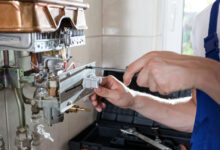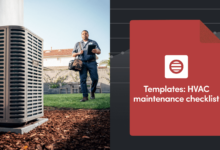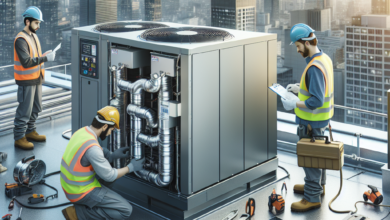HVAC Maintenance Contract Terms and Conditions
HVAC Maintenance Contract Terms and Conditions – When it comes to HVAC systems, proper maintenance is essential for their longevity and efficient operation. One way to ensure regular upkeep and avoid unexpected breakdowns is by entering into an HVAC maintenance contract. Such contracts outline the terms and conditions that govern the maintenance services provided by the contractor. In this blog article, we will delve into the details of HVAC maintenance contract terms and conditions, providing you with a comprehensive guide to help you navigate through this important aspect of HVAC system management.
Understanding the Purpose of an HVAC Maintenance Contract
Having a clear understanding of the purpose of an HVAC maintenance contract is crucial before entering into any agreement. These contracts are designed to establish a mutually beneficial relationship between the homeowner or business owner and the HVAC contractor. By formalizing the terms and conditions of the maintenance services, both parties can have a clear understanding of their rights and obligations. An HVAC maintenance contract provides a framework for regular inspections, preventive maintenance, and timely repairs, ensuring that the HVAC system operates at its optimal level.
The Benefits of Having an HVAC Maintenance Contract
Entering into an HVAC maintenance contract offers several benefits that go beyond just routine maintenance. Firstly, regular maintenance helps improve the energy efficiency of the HVAC system, leading to reduced energy consumption and lower utility bills. Secondly, by identifying and addressing minor issues during maintenance visits, an HVAC contract can prevent major breakdowns and costly repairs in the future. Additionally, having a maintenance contract in place ensures that the system complies with manufacturer requirements, preserving any warranties or guarantees. Lastly, timely inspections and maintenance can help prolong the lifespan of the HVAC system, saving you money in the long run.
Scope of Work and Service Schedule
When it comes to an HVAC maintenance contract, clearly defining the scope of work is crucial to ensure that all necessary tasks are included. The scope of work typically covers a range of maintenance activities, including but not limited to inspections, cleaning, lubrication, filter replacements, and calibration of controls. Each of these tasks plays a vital role in maintaining the efficiency and functionality of the HVAC system. By detailing the scope of work in the contract, both parties can have a clear understanding of what maintenance activities will be performed.
Inspections
Regular inspections are a fundamental part of any HVAC maintenance contract. These inspections involve a thorough assessment of the entire HVAC system, including the air conditioning unit, furnace, heat pump, ductwork, and thermostat. The contractor will examine the system for any signs of wear and tear, leaks, or other issues that could impact its performance. The inspections may also include checking the electrical connections, refrigerant levels, and airflow measurements. By conducting regular inspections, the contractor can identify any potential problems and address them before they worsen or lead to system failure.
Cleaning
Cleaning is another crucial aspect of HVAC maintenance. Over time, dust, debris, and other contaminants can accumulate in the system, affecting its efficiency and air quality. As part of the maintenance contract, the contractor will clean various components of the HVAC system, including the condenser coils, evaporator coils, blower motor, and air filters. Cleaning these components helps improve airflow, reduce energy consumption, and enhance indoor air quality. It is important to outline the specific cleaning tasks and frequency in the contract to ensure that all necessary areas are addressed.
Lubrication
Proper lubrication is essential for the smooth operation of the HVAC system. Moving parts such as motors, bearings, and fans require lubrication to reduce friction and prevent excessive wear. As part of the maintenance contract, the contractor will lubricate these components as per the manufacturer’s recommendations. This helps prolong the lifespan of the HVAC system and reduces the risk of unexpected breakdowns. The contract should specify the type of lubricant to be used and the frequency of lubrication to ensure that it is performed regularly.
Filter Replacements
Regularly replacing air filters is crucial for maintaining good indoor air quality and preventing the accumulation of dust and allergens in the HVAC system. The maintenance contract should outline the frequency at which air filters should be replaced and who is responsible for providing the filters. Some contracts may include the cost of filters in the overall maintenance fee, while others may require the homeowner or business owner to purchase them separately. Clearly defining these details in the contract eliminates any confusion and ensures that air filters are replaced on time.
Duration and Termination
The duration of an HVAC maintenance contract is an important aspect to consider before entering into an agreement. Typically, these contracts can range from one to five years, depending on the preferences of the parties involved. Short-term contracts provide flexibility, allowing homeowners or business owners to evaluate the contractor’s performance before committing to a longer-term agreement. However, long-term contracts often come with added benefits, such as discounted rates or priority service. It is essential to carefully consider the duration that best suits your needs and negotiate the terms accordingly.
Termination Clauses
While entering into an HVAC maintenance contract is a commitment, it is important to have provisions in place for termination if necessary. Termination clauses outline the conditions under which either party can end the contract before the agreed-upon duration. Common termination conditions may include breach of contract, non-payment, or unsatisfactory performance. It is crucial to clearly define these conditions in the contract to avoid any misunderstandings or disputes. Additionally, the contract should outline the notice period required for termination, allowing both parties sufficient time to find alternative arrangements.
Advantages of Short-Term Contracts
Short-term contracts offer several advantages for homeowners or business owners. Firstly, they provide flexibility, allowing you to evaluate the contractor’s performance and decide whether to continue the relationship. Short-term contracts also allow for adjustments in maintenance needs as your requirements change over time. For example, if you plan to upgrade your HVAC system in the near future, a short-term contract can provide the flexibility to adjust the scope of work accordingly. Lastly, short-term contracts can be beneficial if you are unsure about the contractor’s reliability or if you are considering switching to a different service provider.
Advantages of Long-Term Contracts
Long-term HVAC maintenance contracts come with their own set of advantages. Firstly, they often offer cost savings as contractors may offer discounted rates for long-term commitments. This can result in significant savings over the duration of the contract. Additionally, long-term contracts provide peace of mind, knowing that regular maintenance is scheduled and that the contractor is committed to providing quality service. Long-term contracts may also include priority service, ensuring that your HVAC system receives prompt attention when needed. If you have a trusted contractor and plan to stay in your property for an extended period, a long-term contract can provide stability and convenience.
Cost and Payment Terms
One of the key considerations when entering into an HVAC maintenance contract is the cost involved. The cost of an HVAC maintenance contract can vary depending on factors such as the size and complexity of the HVAC system, the scope of work, and the duration of the contract. It is important to carefully consider the cost and negotiate the terms to ensure a fair and reasonable agreement for both parties.
Factors Affecting the Cost
Several factors can influence the cost of an HVAC maintenance contract. Firstly, the size of the HVAC system plays a role. Larger systems may require more time and effort to inspect and maintain, resulting in higher costs. Additionally, the complexity of the system, including any specialized equipment or controls, can impact the cost. The frequency of maintenance visits and the specific tasks included in the scope of work also contribute to the overall cost. Lastly, the reputation and experience of the contractor can influence the pricing, as more reputable contractors may charge higher rates for their services.
Payment Terms
The payment terms of an HVAC maintenance contract should be clearly defined to avoid any confusion or disputes. The contract should outline the total cost of the maintenance services and specify how the payment will be made. Some contracts may require a one-time upfront payment for the entire duration of the contract, while others may offer monthly or annual payment options. It is important to consider your budget and cash flow requirements when deciding on the payment terms. Additionally, the contract should specify the consequences of non-payment, such as suspension of services or termination of the contract.
One-Time Payment
A one-time payment option involves paying the full cost of the HVAC maintenance contract upfront. This payment option offers convenience and ensures that the maintenance services are covered for the entire duration of the contract. It eliminates the need for monthly or annual payments and provides peace of mind knowing that the services are paid for in advance. However, the one-time payment option may require a larger upfront investment, which may not be feasible for everyone. It is important to carefully consider your financial situation before opting for this payment method.
Monthly Installments
Monthly installments involve dividing the total cost of the HVAC maintenance contract into equal monthly payments. This payment option provides flexibility and allows for easier budgeting as the cost is spread out over the duration of the contract. Monthly installments can be more manageable for homeowners or business owners who prefer to allocate a portion of their budget towards HVAC maintenance on a regular basis. However, it is important to budget accordingly and ensure that the monthly payments are made on time to avoid any disruptions in service.
Annual Fees</
Annual Fees
Some HVAC maintenance contracts may offer the option of paying an annual fee for the maintenance services. With this payment option, the total cost of the contract is divided into smaller, annual payments. This can be beneficial for homeowners or business owners who prefer to make a single payment each year rather than monthly installments. Annual fees provide convenience and ensure that the maintenance services are covered for the entire year. However, it is important to note that this payment option may require a larger upfront payment compared to monthly installments.
Additional Costs and Exclusions
It is important to carefully review the contract for any additional costs or exclusions that may not be covered by the base maintenance fee. Some contracts may include additional charges for services such as emergency repairs, replacement parts, or after-hours service calls. It is crucial to have a clear understanding of these additional costs and ensure that they are outlined in the contract. Additionally, the contract should clearly specify any exclusions or limitations on coverage, such as damage caused by negligence or acts of nature. Understanding these aspects will help you budget accordingly and avoid any unexpected expenses.
Emergency Repairs and Additional Services
While regular maintenance visits play a crucial role in preventing major breakdowns, there may still be instances where emergency repairs or additional services are required. It is important to understand how an HVAC maintenance contract addresses such situations to ensure that you are adequately covered.
Emergency Repair Response Times
An HVAC maintenance contract should outline the response times for emergency repairs. Emergency situations such as system failures or major malfunctions require immediate attention to minimize downtime and discomfort. The contract should clearly specify the maximum response time for emergency calls and outline the steps to be taken by both parties during such situations. This ensures that the contractor is available and committed to providing prompt service when you need it the most.
Additional Services and Costs
In addition to regular maintenance, there may be instances where additional services are required to address specific issues with the HVAC system. These services could include repairs, parts replacements, or system upgrades. The maintenance contract should specify how such additional services will be handled. It should outline the process for requesting additional services, the associated costs, and the contractor’s obligation to provide a detailed estimate before proceeding with any work. Having these details in the contract ensures transparency and avoids any surprises when additional services are required.
Warranty and Liability
Understanding the warranty and liability aspects of an HVAC maintenance contract is crucial to protect your interests and ensure that you are not held responsible for any damages or faults that may occur during the maintenance process.
Contractor’s Responsibility and Workmanship Warranty
An HVAC maintenance contract should clearly outline the contractor’s responsibility for the work performed. This includes ensuring that the maintenance services are carried out in a professional and competent manner. The contract should specify that the contractor will adhere to industry best practices, manufacturer guidelines, and any applicable codes and regulations. Additionally, the contract should include a workmanship warranty, which guarantees that the contractor will rectify any issues arising from their work at no additional cost within a specified timeframe. The workmanship warranty provides you with peace of mind, knowing that the contractor stands behind their work.
Manufacturer’s Warranty and Compliance
Most HVAC systems come with manufacturer warranties that cover certain components or parts for a specified period. The maintenance contract should outline the contractor’s responsibility to ensure that the maintenance services comply with the manufacturer’s requirements. This is important to preserve any warranties or guarantees that may be in place. The contract should specify that the contractor will use genuine parts and follow the manufacturer’s recommended maintenance procedures. Failure to comply with these requirements could void the manufacturer’s warranty, leaving you responsible for any repair or replacement costs.
Liability and Insurance Coverage
An HVAC maintenance contract should address the issue of liability and insurance coverage. The contract should clearly specify that the contractor carries adequate insurance coverage, including general liability insurance and workers’ compensation insurance. This protects you from any liability in case of accidents, damages, or injuries that may occur during the maintenance visits. It is important to request proof of insurance from the contractor and ensure that the contract includes a clause stating that you will be named as an additional insured on the contractor’s insurance policy.
Dispute Resolution
While it is always preferable to have a smooth and amicable relationship with your HVAC contractor, disputes can sometimes arise. To avoid lengthy and costly legal proceedings, it is important to include a dispute resolution mechanism in your HVAC maintenance contract.
Mediation
Mediation is a voluntary and informal process where a neutral third party helps facilitate communication and negotiation between the parties involved in a dispute. Including a mediation clause in your HVAC maintenance contract means that if a dispute arises, both parties agree to attempt mediation before pursuing any other legal remedies. Mediation provides an opportunity for open dialogue and can often result in a mutually acceptable resolution without the need for litigation.
Arbitration
Arbitration is a more formal dispute resolution process where an arbitrator, or a panel of arbitrators, hears the arguments and evidence presented by both parties and makes a binding decision. Including an arbitration clause in your HVAC maintenance contract means that if mediation fails, the dispute will be resolved through arbitration rather than litigation. Arbitration can be faster and less expensive than traditional court proceedings, providing a more efficient way to resolve disputes.
Choice of Law and Jurisdiction
It is important to specify in the HVAC maintenance contract the choice of law and jurisdiction that will govern any disputes that may arise. This ensures that both parties have a clear understanding of the legal framework within which the contract operates. The choice of law determines which state or country’s laws will be applied, while the jurisdiction determines which court or arbitration panel will have authority over the dispute. Including these provisions in the contract provides clarity and can help avoid conflicts over jurisdictional issues.
Renewal and Amendments
HVAC maintenance contracts are typically renewable, allowing you to continue the relationship with your contractor and ensure ongoing maintenance of your HVAC system. It is important to understand the renewal process and the options available for amending the contract.
Renewal Process
The renewal process for an HVAC maintenance contract should be clearly outlined in the original contract. Typically, the contract will specify the notice period required for renewal, allowing both parties sufficient time to evaluate their options and make an informed decision. It is important to review the terms of the contract before renewal and consider any changes in requirements or circumstances that may necessitate adjustments to the scope of work or pricing.
Amendments and Modifications
During the course of an HVAC maintenance contract, there may be instances where amendments or modifications are necessary. These changes could be due to changes in the HVAC system, adjustments in maintenance requirements, or other factors that impact the original contract. It is important to have a process in place for requesting and documenting amendments. This ensures that any changes to the contract are agreed upon by both parties and that there is a clear record of the modifications made.
Contractor Obligations and Performance Standards
An HVAC maintenance contract should clearly outline the obligations of the contractor to ensure that the maintenance services are performed to a satisfactory standard.
Performance Standards
The contract should specify the performance standards that the contractor is expected to meet. This includes factors such as response times for maintenance visits, completion of tasks within a specified timeframe, and adherence to industry best practices. The contract should also outline the consequences for failing to meet these performance standards, such as penalties or termination of the contract. Clearly defining the performance standards in the contract helps ensure that you receive the quality of service you expect.
Documentation and Reporting
Proper documentation and reporting are essential for accountability and transparency in an HVAC maintenance contract. The contract should specify that the contractor is responsible for maintaining accurate records of all maintenance visits, inspections, and any work performed. This documentation should include details such as the date of the visit, tasks completed, any issues identified, and any recommendations made by the contractor. The contract should also outline the frequency and format of reporting, ensuring that you receive regular updates on the status of your HVAC system and any maintenance activities performed.
Best Practices for Choosing a Reliable Contractor
Choosing a reliable HVAC maintenance contractor is crucial to ensure that your HVAC system receives the necessary care and attention. Here are some best practices to consider when selecting a contractor.
Experience and Expertise
Look for a contractor with extensive experience in HVAC maintenance. A contractor who has been in the industry for several years is likely to have a deeper understanding of different HVAC systems and the specific maintenance requirements for each. Additionally, consider contractors who have relevant certifications or qualifications that demonstrate their expertise and commitment to professional standards.
Reputation and References
Do some research and check the contractor’s reputation in the industry. Look for online reviews, testimonials, or recommendations from previous clients. A reputable contractor will have a track record of providing quality service and maintaining strong relationships with their customers. Request references from the contractor and reach out to their past clients to inquire about their experience and satisfaction with the maintenance services provided.
Availability and Responsiveness
<p
Availability and Responsiveness
Ensure that the contractor is readily available and responsive to your needs. HVAC systems can encounter issues at any time, so it is important to choose a contractor who offers prompt and reliable service. Inquire about their response times for emergencies and their availability for regular maintenance visits. A contractor who can quickly address any issues that arise and provide timely maintenance services will help minimize downtime and keep your HVAC system running smoothly.
Contract Terms and Conditions
Thoroughly review the terms and conditions of the HVAC maintenance contract offered by the contractor. Pay attention to the scope of work, duration, payment terms, and any other relevant provisions. Ensure that the contract aligns with your specific needs and preferences. If there are any areas of concern or ambiguity, discuss them with the contractor and seek clarification before signing the contract. A reliable contractor will be transparent and willing to address any questions or concerns you may have.
Insurance and Licensing
Verify that the contractor carries the necessary insurance coverage, including general liability insurance and workers’ compensation insurance. This protects you from any liability in the event of accidents or damages that may occur during the maintenance visits. Additionally, ensure that the contractor holds the required licenses and certifications to perform HVAC maintenance services. Checking these credentials provides assurance that the contractor meets industry standards and is qualified to work on your HVAC system.
Contractual Agreements
Before finalizing the agreement, carefully read and understand all contractual agreements. Pay attention to any clauses related to termination, renewal, dispute resolution, and warranties. Ensure that you are comfortable with the terms and that they align with your expectations. If there are any areas of concern or disagreement, discuss them with the contractor and consider seeking legal advice if necessary. It is important to enter into the contract with a clear understanding of your rights and obligations.
Get Multiple Quotes
Obtain multiple quotes from different contractors to compare pricing, services, and terms. This allows you to make an informed decision based on the best value for your needs. However, be cautious of choosing solely based on the lowest price. Consider the reputation, experience, and qualifications of the contractors along with their pricing. The goal is to find a contractor who offers a fair price while delivering quality service and meeting your specific requirements.
Ask for a Maintenance Plan
Inquire about the contractor’s maintenance plan and how it aligns with your HVAC system’s needs. A comprehensive maintenance plan should cover all essential tasks and be tailored to the specific requirements of your system. Ask the contractor to provide a detailed outline of the maintenance activities they will perform and the frequency of visits. A contractor who can clearly explain their maintenance plan and demonstrate their understanding of your system’s needs is more likely to provide effective and reliable service.
Consider Long-Term Relationships
Building a long-term relationship with a reliable HVAC maintenance contractor can provide numerous benefits. Consider contractors who are interested in establishing a long-term partnership and are committed to maintaining your HVAC system for years to come. Long-term relationships often result in better understanding of your system’s unique requirements, improved efficiency, and personalized service. Additionally, a long-term partnership can lead to cost savings and priority service, as the contractor becomes familiar with your system and can provide more efficient and effective maintenance.
In conclusion, understanding HVAC maintenance contract terms and conditions is crucial for ensuring the smooth operation and longevity of your HVAC system. By having a comprehensive guide like this at your disposal, you can make informed decisions when entering into a contract and maximize the benefits of regular maintenance. Remember, an HVAC maintenance contract is not just a piece of paper but a valuable tool in ensuring your comfort and peace of mind.









